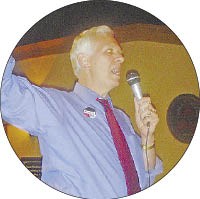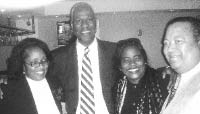Pardon my French, but that hoary Gallic cliché has to be trotted out one more time: “The more things change, the more they remain the same.”
After all the advance agony about new Diebold machines and anticipation in some quarters of massive electoral turnover, nothing much happened in last week’s Shelby County election to distinguish it from previous elections.
Even the county’s recent habit of sluggish turnout recurred — at least on Election Day itself, when the total vote, for the first time ever, lagged behind the two prior weeks of early voting.
But there were signs of changes to come. In what could turn out to be this election’s sleeper element, a brand-new Charter Commission was elected, charged with the task of offering a redesign of Memphis city government. (See John Branston’s story, p. 23).
And something new was signified by two big winners in Thursday’s voting: Ninth District congressional candidate Steve Cohen, victorious in the Democratic primary, and Steve Mulroy, winner of the pivotal District 5 position on the Shelby County Commission. Cohen will be heavily favored in the coming November general election against Republican Mark White and independent Jake Ford — though no fewer than three political scientists were quoted in a post-election AP article as cautioning that Ford (whose last contest was against a “bad guy” in the wrestling ring at the Mid-South Coliseum) had to be taken seriously.
Mulroy has won his position outright, and his relatively easy victory over Republican nominee Jane Pierotti reverses the current 7-6 partisan breakdown in the Democrats’ favor. An activist whose energy and scope was displayed over the last year in such causes as the effort to save Libertyland and voting-machine reform, Mulroy had become a fixture of the local scene even before his involvement in the commission race.
When an impressed observer commented to Mulroy on election night about his win, “You know, Steve, a year ago I had never heard of you,” the clearly ebullient lawyer said modestly, “A year ago I hadn’t even heard of me!”
 Jackson Baker
Jackson Baker
Left to right: Bobby Lanier with County Mayor A C Wharton; Sheriff Mark Luttrell at Sidney Chism’s picnic; Senator Steve Cohen and District 5 County Commission winner, Steve Mulroy, celebrating at Palm Court on election night.
To no one’s great surprise, incumbent Democratic county mayor A C Wharton easily won reelection, as did Sheriff Mark Luttrell and District Attorney General Bill Gibbons, both Republicans.
Several countywide positions were won narrowly by Republican incumbents on the basis of the final precincts counted, dashing the hopes of several Democrats who led for much of the night. Judicial elections saw most incumbents and other pre-election favorites triumphant — though incumbent judges Michelle Alexander-Best and Donn Southern were defeated by Karen Massey and Karen Webster, respectively.
Prosecutor Lee Coffee won a hotly contested multi-candidate race in Criminal Court, Division 7, another prosecutor, Jim Lammey, won an open seat in Division 5, and Deborah Henderson eked out a narrow win over Regina Morrison Newman for a General Sessions, Division 4, judgeship.
As expected, retiring state senator Curtis Person was elected Juvenile Court judge over four opponents — three of whom were black female Democrats with overlapping constituencies. (The campaign-long mutual recriminations between Veronica Coleman and Earnestine Hunt Dorse — and between each of them and Jayne Chandler — accelerated a bit after election day.)
 Jackson Baker
Jackson Baker
Bill Gibbons
Winners in legislative races, besides the favored incumbents, were Steve McManus in the Republican primary for District 96 (vacated by Paul Stanley, winner of the GOP state Senate primary in District 31); Ron Lollar in the GOP primary for House District 99; and a rematched Ophelia Ford and Terry Roland, Democrat and Republican, respectively, for the state Senate District 29 seat that was declared void after last year’s suspect special election.
Educator Bill Morrison won the Democratic primary in the 7th Congressional District, earning the right to face GOP incumbent Marsha Blackburn in November. (Though he is a long-odds underdog, Morrison indicated his seriousness by launching a whirlwind tour of West Tennessee counties the morning after the election.)
 Jackson Baker
Jackson Baker
Victorious judges Gwen Rooks, Carolyn Blackett, and Tony Johnson at a fund-raiser with Memphis mayor Willie Herenton.
Statewide, Governor Phil Bredesen and state Senator Jim Bryson of Franklin handily won the Democratic and Republican gubernatorial primaries, respectively. Easy wins were also had in the U.S. Senate primaries for Democrat Harold Ford Jr. and Republican Bob Corker.
The Senate race is almost certain to loom large on the barometer of national politics this fall. But in the short run, nothing competed for dramatic impact with Cohen’s victory in the 9th District Democratic primary over a long list of contenders, including newcomers Nikki Tinker and Ed Stanton, lawyer Joe Ford Jr., and outgoing Shelby County commisioner Julian Bolton.
During the campaign, Cohen came under strenuous attack — especially from Tinker surrogates and from Bolton, the latter of whom made explicit a simmering concern in some quarters that Cohen was too white and too Jewish to represent the predominantly black 9th District. (See Chris Davis’ story, p. 24)
Cohen, who was backed by several prominent African Americans, overcame such sentiments — capturing almost a third of the total vote in the 15-strong primary field (in the process capturing, one report suggested, as much as 15 percent of the district’s black vote). And, 10 years after his first try for Congress, he was poised on the edge of a long-coveted status on the national stage. The contrast to 1996 couldn’t have been more obvious. The Steve Cohen who mounted a platform at Palm Court in Overton Square last Thursday night was smiling. He was surrounded by celebrants, not commiserants. And instead of the bitterness that had quickly settled over him when the racial dimensions of his defeat became obvious 10 years ago, this Cohen was suffused with the calm of knowing that he had picked up significant support in all quarters of the 9th District constituency.
Cohen, a public official for almost three of his five-odd decades, won’t formally ascend to the pinnacle of his ambitions until after the November election. Technically, the fat lady hasn’t sung yet. But you could tell she was tuning up from the hum of jubilation that surrounded Cohen as he began to speak to his throng of supporters.
Cohen began on a sedate note. “I’ve had victories, and I’ve had defeats,” he said, even seeming to tear up a little as he recalled that other August in 1996, when he had been on the wrong end of a 2-to-1 shellacking by Harold Ford Jr., the congressman’s son who would become a congressman in his own right and then a national figure.
 Jackson Baker
Jackson Baker
Phil Bredesen with two Memphis supporters.
But Cohen found the silver lining: That defeat, he said, had made it possible for Ford, a “great, charismatic congressman” to serve “with pride and distinction” in the House and to be on the brink of his own glorious opportunity. Together, Cohen said, he and Ford could now do significant things for the people of Memphis and Tennessee.
And, Cohen said, serving another decade in the state Senate had allowed him to bring to fruition his dream of a state lottery — the crowning achievement of his 26 years there. A lusty cheer rang out from the crowd at this artful — and evidently sincere — squaring of a personal cycle.
Other Democrats had failed to win, Cohen said, in acknowledgement that most of his party’s nominees for countywide offices were in difficult straits. But they, too, he promised, would have a chance at some future redemption.
One of those defeated Democrats, lawyer Gail Mathes, who had waged a spirited campaign against victorious Republican incumbent Gibbons for District Attorney General, would shortly arrive to congratulate and embrace the victorious Cohen. Despite flooding Democratic households with robo-calls from 2004 Democratic presidential contender John Kerry and, on the last day of the campaign, former president Bill Clinton, Mathes’ campaign had come up well short, and Mathes seemed calmly resigned to the outcome. And philosophical.
“This race may have encouraged him [Gibbons] to be more active on the job,” Mathes told the Flyer‘s Bianca Phillips at a post-election gathering for Democratic candidates at the University of Memphis Holiday Inn. That fact, she said, may have made her losing effort worthwhile. “We would not be in the [crime] situation we’re in if he had worked as hard for his entire term as he has in the last seven months.”
Understandably, Gibbons didn’t see things that way. On the basis of early-voting returns alone — which showed him leading Mathes by 20 percentage points, the incumbent D.A. made an early victory speech to cheering supporters at the Fox and Hound Restaurant on Sanderlin, telling them, “I regard this as an endorsement by the people for our decision to confront violent crime.”
He acknowledged privately that crime statistics had gone up in the last two years but said the election outcome indicated his good-faith efforts were properly understood and appreciated. Calling himself “a uniter, not a divider,” Gibbons, who was supported by several key Democrats during his campaign, said he had enjoyed across-the-board support.
Other disappointed Democrats, notably Juvenile Court clerk candidate Shep Wilbun, were not quite so sanguine about their defeats. Late returns made Wilbun the apparent loser — by the margin of a few hundred votes — to incumbent Republican Steve Stamson, who had narrowly taken the clerkship from Wilbun four years ago.
An aggrieved Wilbun, who has blamed his 2002 loss on what he regards as trumped-up (and later dismissed) charges of misconduct that were brought against him during that campaign, now suspected dirty pool again and reportedly stormed down to the Election Commission office in an effort at protest.
Who could blame him? Counting a one-vote loss on the local Democratic executive committee in 2000 that kept him from being the party nominee for county register, it was Wilbun’s third near-miss of the young millennium.
Three other Democrats — Otis Jackson, running for Shelby County clerk against Republican Debbie Stamson; Sondra Becton, making her second consecutive race against former boss Chris Thomas in the Probate Court clerk’s race; and Vernon Johnson, challenging incumbent Republican Criminal Court clerk Bill Key — had similar hair-breadth losses after being on the cusp of apparent victories. (The two Stamsons are a husband-and-wife team.)
Other GOP winners were incumbent Trustee Bob Patterson over Democrat Rebecca Clark, incumbent Circuit Court clerk Jimmy Moore over Roderic Ford, and incumbent Register Tom Leatherwood over Democrat Coleman Thompson.
The most convincing win was that of county mayor Wharton over Republican challenger John Willingham, an outgoing Shelby County commissioner who has levied a number of complaints — some plausible and enduring — against the Shelby County government establishment in recent years.
But Willingham, who was among the first to decry the terms of the now suspect city/county contract to build the FedExForum as an arena for the NBA’s Grizzlies, could not convert any of his crusades into electoral success. The popular Wharton obliterated him by a margin of almost 3-to-1.
Informed early Thursday night of the first totals showing such a gulf, Willingham shrugged and said merely, “This is bad.” It remains to be seen whether he will go on to challenge voting procedures, as he did when he lost another lopsided race against Memphis mayor Willie Herenton in 2003.
Some clue may be had from the fact that late Thursday night Willingham supporter Warren Cole made an appearance at the Election Commission and told the Flyer‘s Greg Akers that he had “suspicions” about the accuracy of the early-voting results and about the election-day totals as well.
After the discovery on Thursday that an election-eve scare concerning a purportedly stolen ballot box had been based on a misunderstanding, concern in most political quarters had settled on the remarkable fact that election-day totals had lagged well behind those of a two-week early-voting period.
The long lines and lengthy delays of early voting had been well publicized, perhaps to the point that many voters who had waited until August 3rd, when a massive turnout had been predicted, had been discouraged and did not bother to vote. Whatever its cause, Thursday’s lighter-than-expected turnout may have resulted in totals skewed to elderly and suburban voters, who presumably had enjoyed a larger window of opportunity during early voting than had the city’s working-class population.

Harold Ford Jr.
In any event, the long-predicted swing of voter dominance to the county’s Democrats — predicted in every election since 1990 — has yet to occur, despite what would seem to be an ever-increasing demographic advantage based on the growing preponderance of African Americans in Shelby County.
The black voting base of Shelby County is expected, however, to emerge as a major factor in voting this November — particularly on behalf of Harold Ford’s Senate bid against Corker, the former Chattanooga mayor who won a convincing victory over two primary foes, former congressmen Ed Bryant and Van Hilleary.
Though Corker’s campaign rhetoric reflected obeisance to the same fiscal and social conservatism that animated Bryant and Hilleary, he is widely perceived as having a more moderate profile, and this fact, coupled with Ford’s own propensity these days for moderate-to-conservative rhetoric, could mean that demographic factors will count for more than usual in a statewide election.
They will increasingly account for more than usual in countywide elections, too, as the victorious Gibbons, in a swing by county Republican headquarters late in the evening, made clear.
The Flyer‘s Shea O’Rourke was on hand when the D.A. had this to say to the GOP faithful gathered there: “I want to talk to you as my fellow Republicans, and I think the message is clear from this. [GOP chairman]Bill Giannini and I have talked about this a lot — we are a Democratic county now. I think all of us realize that. And in order to survive as a political party in this county, we have got to be willing to reach out to other right-thinking Democrats and bring them along with us.”
Moments later, a victorious Sheriff Mark Luttrell said something similar: “I think one of the things as Republicans that we have to do is to really reach out, because if we don’t reach out, I think we’re going to be marginalized even more. And when I say ‘reach out,’ I’m not talking about compromising anything. I’m talking about getting out there and convincing people that the message that we have is the right message.”
At that, a woman in the audience yelled out “Amen!” And the hearty applause that came next indicated that — to the Republicans on hand, at least — the sentiments expressed by Gibbons and Luttrell would be a key part of that message.
Greg Akers, Shea O’Rourke and Bianca Phillips also contributed to this story.